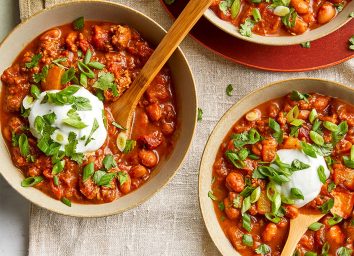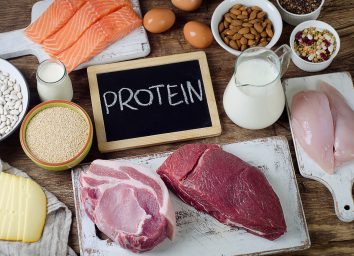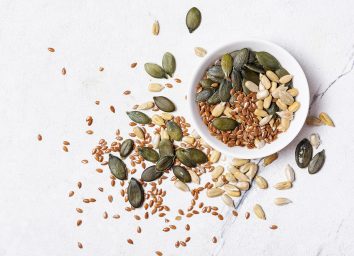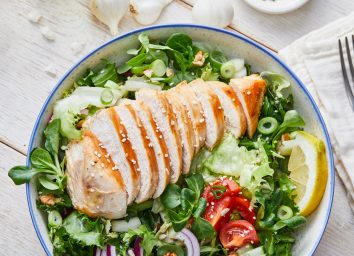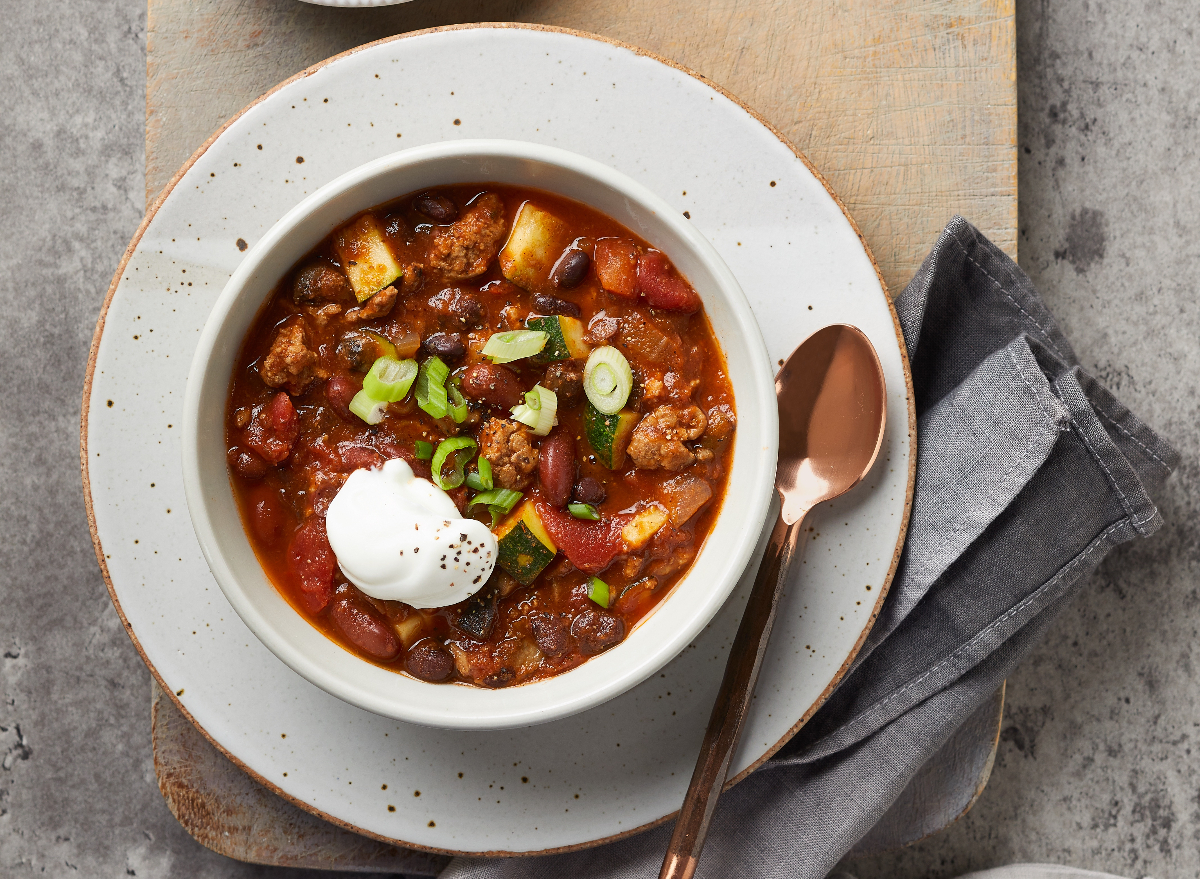
According to the American Heart Association, plaque buildup in your arteries begins when you're young and progresses slowly into adulthood. As you get older, this can lead to hypertension, stroke, and coronary heart disease, which is the leading cause of death in the U.S. and the number one killer among women. However, what you eat can help mitigate your risk for heart disease while simultaneously lowering your blood cholesterol and better regulating your blood pressure. Having a heart-healthy meal plan to cater to your heart health can be a great first step to turning things around for the better.
With only a few days left in American Heart Month, we wanted to empower you with knowledge and resources that can enable easy, quality recipes and eating choices with your heart health in mind—particularly for busy weekdays. Here's why high cholesterol and blood pressure can lead to health issues, which foods you should focus on to support your heart health, and a five-day heart-healthy meal plan to help make weekday meal prep a breeze. Read on, and for more heart-healthy eating tips, be sure to also check out These 5 Eating Habits Can Save Your Heart, Says Cardiologist.
Heart-healthy eating basics
The American Heart Association notes that a heart-healthy meal plan should include:
- A wide variety of fruit and veggies.
- Whole grains and products made from mostly whole grains.
- Healthy sources of protein including plants like beans, peas, lentils, and nuts; fish and seafood; low-fat and nonfat dairy, and lean and unprocessed meat and poultry.
- Vegetable oils (excluding tropical oils, like coconut and palm kernel).
- Minimized intake of added sugars.
- Foods prepared with little or no salt.
- Limited or no intake of alcohol.
Understanding high cholesterol
Although your body needs cholesterol to build cells and help make vitamins and other hormones, too much cholesterol can lead to plaque buildup, which can result in a number of health issues, including heart disease.
Cholesterol comes from two sources: First, your liver makes all the cholesterol your body needs. The rest then comes from many animal-based foods like poultry, some milk and dairy foods, meats, and eggs. Eating too much of these types of food, especially those high in saturated fat, causes your liver to make more cholesterol than you otherwise would. For some people, the additional production of cholesterol can lead to high cholesterol levels.
There are several types of cholesterol. Low-density lipoprotein cholesterol or LDL cholesterol, also known as the "bad" cholesterol, should ideally be at or below 100 mg/dL. High levels can lead to heart disease and stroke. High-density lipoprotein cholesterol or HDL cholesterol, also known as the "good" cholesterol, should be high which can help reduce your risk of heart disease and stroke.
Cholesterol can combine with other substances to create a hard deposit on the inside of the arteries, which is known as plaque buildup. This leads to the narrowing of the arteries and makes them less flexible, a condition known as atherosclerosis. If a blood clot forms and blocks these narrower arteries, that is when you can have a heart attack or stroke.
Understanding your blood pressure
Normal blood pressure is 120/80 mmHg, and the fluctuation of these numbers throughout the day is to be expected.
The top or "systolic" number measures the pressure your heart applies to your arteries' walls. The bottom or "diastolic" number measures the pressure exerted on your arteries' walls between heartbeats.
When the systolic number equals or exceeds 130 and the diastolic number equals or exceeds 80, your readings would be in the hypertensive range. In other words, blood pressure readings that consistently clock in at 130/80 mmHg or higher are considered to be high blood pressure. In addition to negatively impacting your circulatory system, high blood pressure can leave you vulnerable to other serious health problems, including stroke, heart attack, and heart disease.
Though physical activity and other lifestyle choices (i.e., not smoking) play a large part in keeping your blood pressure in a healthy range, diet is also critical to this aim. When it comes to eating for your blood pressure, the diet is the same as a heart-healthy one with plenty of fruits, veggies, whole grains, lean meats or plant-based proteins, healthy fats, and non- or low-fat dairy. Flavoring your food with herbs and spices, eating enough potassium, and minimizing foods with salt are also recommended.
Heart-healthy meal plan: 5 days of meals for heart health
To help you get on track with the best weekday eating routine able to support your cardiovascular health, here's a five-day meal plan for heart health that includes suggestions for breakfast, lunch, dinner, and even snacks!
Day 1
- Breakfast: Apple Pie Parfaits
- Mid-Morning Snack: Cheese & crackers
- Lunch: Healthier Grilled Caesar Salad
- Snack: Parmesan Rosemary Popcorn
- Dinner: Grilled Mahi-Mahi With Salsa Verde
Breakfast: Apple Pie Parfaits
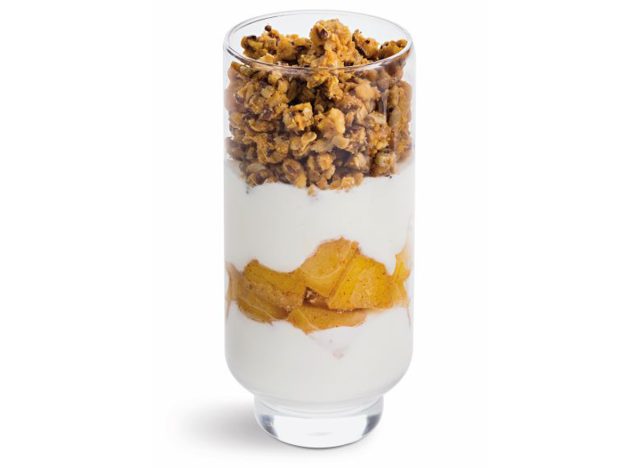
Make these delicious parfaits for breakfast and any extras can be eaten as a snack or even dessert.
Get the recipe for Apple Pie Parfaits.
Mid-Morning Snack: Cheese & crackers
Whole grains and cheese provide nutrients like calcium and fiber, which are under-consumed by most folks.
- 6-8 whole wheat crackers
- 1 oz reduced-fat cheddar cheese
Lunch: Grilled Chicken Caesar Salad
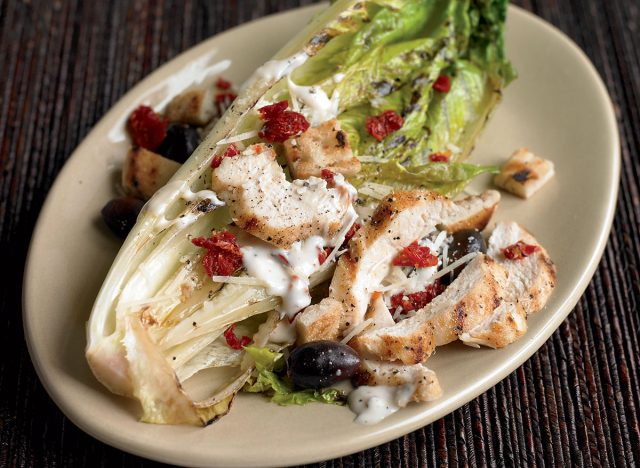
Grill the chicken in advance or use leftover grilled chicken to create this healthier version of a Caesar's Salad. Pair with a whole grain bread and fruit for dessert.
- Grilled Caesar Salad
- 1 small whole wheat roll with 1 tsp butter
- 1 orange
Get the recipe for Healthier Grilled Caesar Salad.
Afternoon Snack: Parmesan Rosemary Popcorn
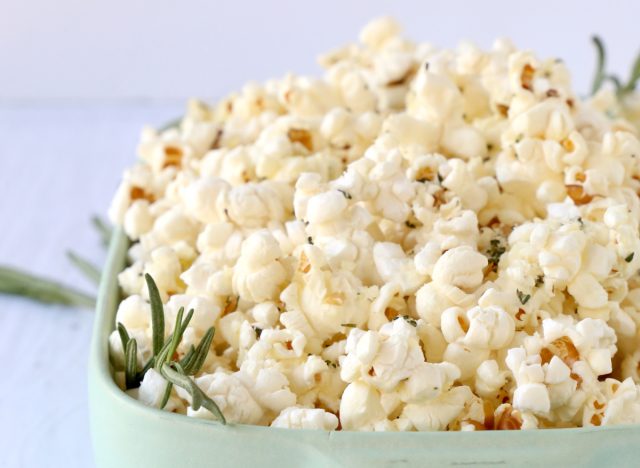
Popcorn is a whole grain and a fun, crunchy snack to pick you up during that afternoon slump.
Get the recipe for Parmesan Rosemary Popcorn.
Dinner: Grilled Mahi-Mahi With Salsa Verde
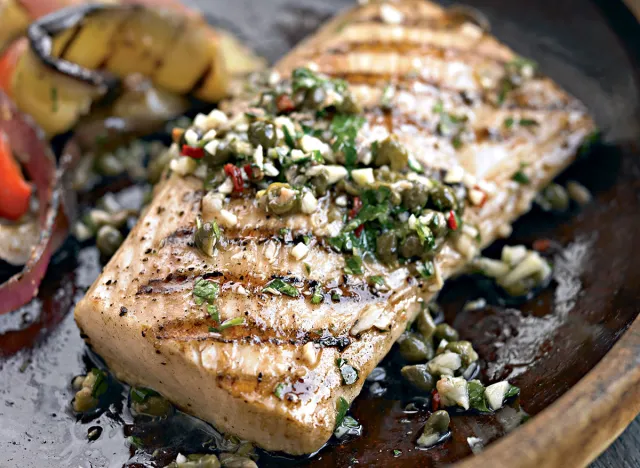
Use an indoor grill pan or even saute pan to cook these mahi mahi filets during the colder months. Compliment the fish with a side of roasted veggies, potatoes and a little fruit to satisfy your sweet tooth.
- Grilled Mahi-Mahi
- 1 cup roasted baby carrots
- Half a baked potato topped with 1 tbsp nonfat plain Greek yogurt and chopped cilantro
- 1 cup sliced honeydew melon
Get the recipe for Grilled Mahi-Mahi With Salsa Verde.
Day 2
- Breakfast: Crunchy Breakfast Salad With Eggs
- Mid-Morning Snack: Hummus & vegetables
- Lunch: Quick Chicken Burger With Sun-Dried Tomato Aioli
- Snack: Afternoon Trail Mix
- Dinner: Turkey and Two-Bean Chili
Breakfast: Crunchy Breakfast Salad With Eggs
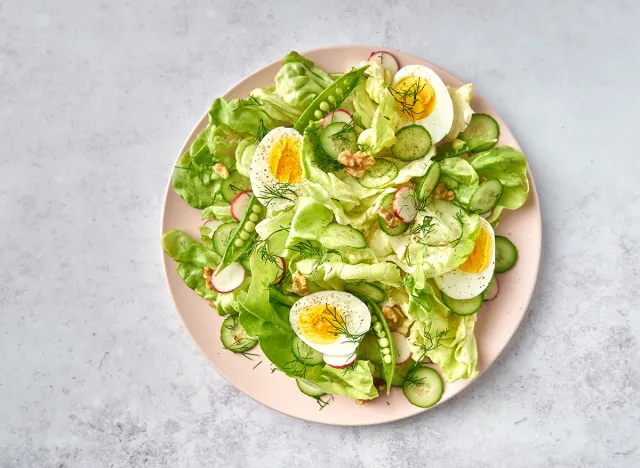
A heart-healthy diet is filled with fruits and veggies- which is exactly what you're getting in this delicious breakfast.
- Breakfast salad & eggs
- 1 cup mixed berries
Get the recipe for Crunchy Breakfast Salad With Eggs.
Mid-Morning Snack: Hummus & vegetables
An easy snack you can put together in minutes is hummus and cut up veggies.
- 1/4 cup hummus
- 1 cup cut up vegetables like celery, bell peppers, zucchini, and carrots
Lunch: Quick Chicken Burger With Sun-Dried Tomato Aioli
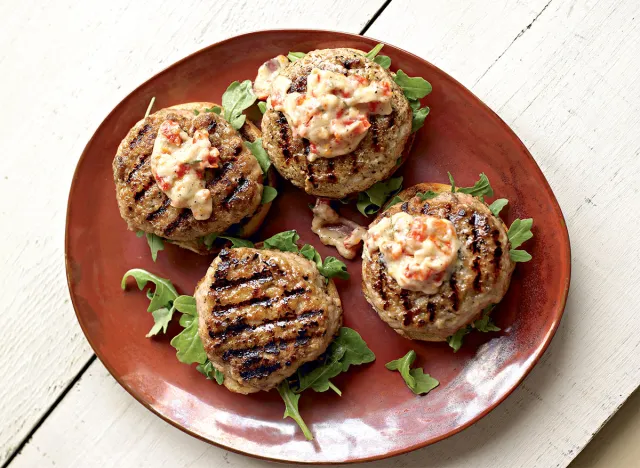
These chicken burgers on whole wheat buns make a warming lunch and are paired with some raw veggies and fruit for dessert.
- Chicken Burger
- 1 cup fresh baby carrots
- 1 cup diced pineapple
Get the recipe for Quick Chicken Burger With Sun-Dried Tomato Aioli.
Afternoon Snack: Afternoon Trail Mix
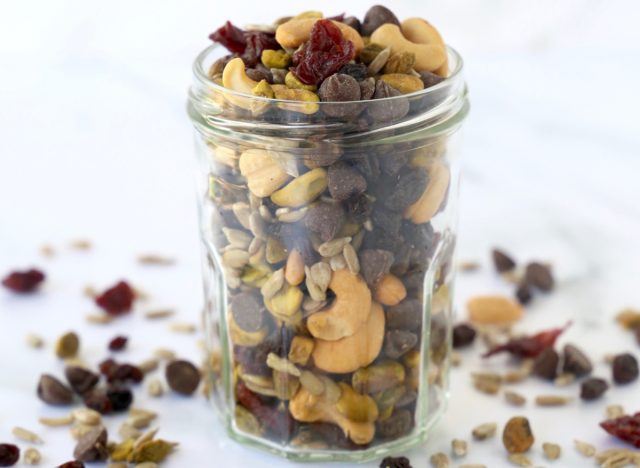
Healthy fats from nuts and seeds make up this heart-healthy trail mix.
Get the recipe for Afternoon Trail Mix.
Dinner: Turkey and Two-Bean Chili
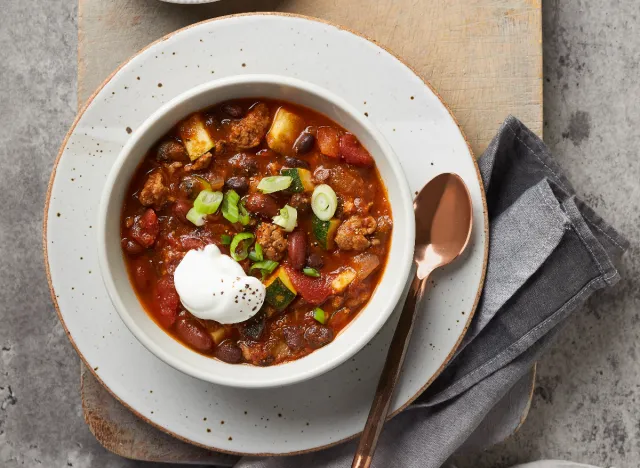
A delicious bean-filled chili paired with a green salad and fruit for dessert. You can also freeze those grapes before eating.
- Turkey and Two-Bean Chili
- Mixed green salad topped with1 tbsp balsamic vinaigrette
- 1 cup seedless grapes
Get the recipe for Turkey and Two-Bean Chili.
Day 3
- Breakfast: Blueberry Zucchini Waffles
- Mid-Morning Snack: Cashews
- Lunch: Grilled Vegetable Wrap
- Snack: Greek yogurt, blueberries, almonds
- Dinner: Turkey Sloppy Joes
Breakfast: Blueberry Zucchini Waffles
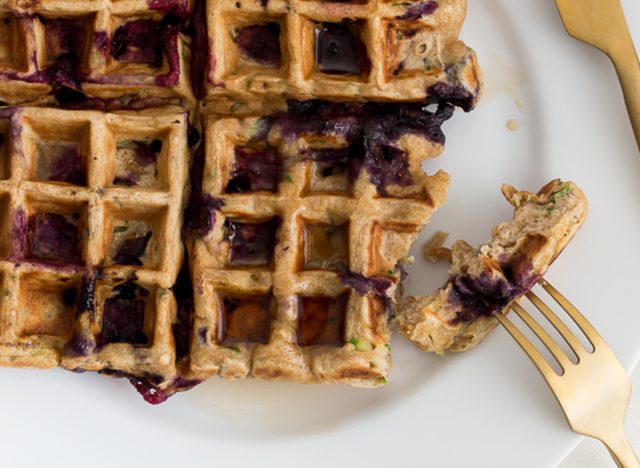
Give these waffles a whirl and you'll be pleasantly surprised. Add a spoonful or two of Greek yogurt with the maple syrup if you want more protein.
Get the recipe for Blueberry Zucchini Waffles topped with 1 tbsp 100% maple syrup
Mid-Morning Snack: Cashews
Healthy fat from cashews or any nut of choice is a simple heart-healthy snack option. Switch up the nuts to pistachios, almonds, or even peanuts.
- 1/4 cup raw cashews
Lunch: Grilled Vegetable Wrap
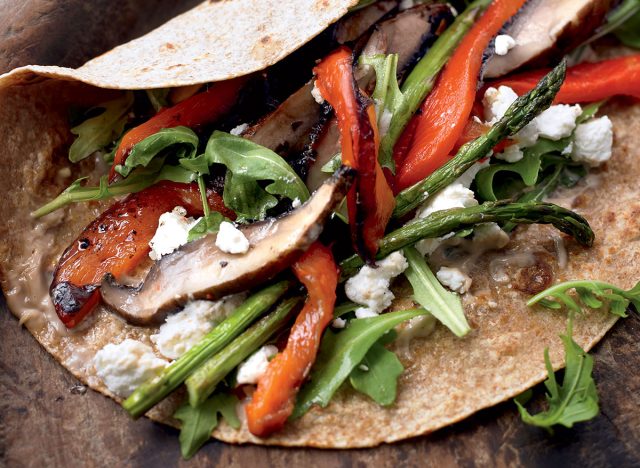
Get your veggie groove going with these veggie wraps and finish the meal with a cup of sweet melon.
- Grilled veggie wrap
- 1 cup diced melon
Get the recipe for Grilled Vegetable Wrap.
Afternoon Snack: Greek yogurt, blueberries, almonds
Don't forget dairy is part of your heart healthy diet. Here Greek yogurt is complemented with fruit and healthy fat from nuts.
- ½ cup nonfat plain Greek yogurt
- ½ cup fresh blueberries
- 1 tbsp chopped raw almonds
Dinner: Turkey Sloppy Joes
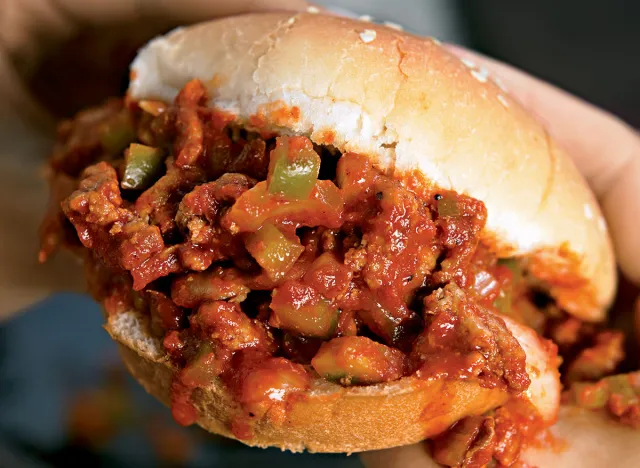
Who doesn't love sloppy joes for dinner? Made with lean turkey and paired with a green salad, it's a most satisfying heart-healthy dinner.
Mixed green salad topped with1 tbsp balsamic vinaigrette
Get the recipe for Turkey Sloppy Joes.
Day 4
- Breakfast: Nutty Raisin Oatmeal
- Mid-Morning Snack: Greek yogurt, strawberries, almonds
- Lunch: Grilled Chicken and Avocado Salad
- Snack: Artichoke Dip & pita
- Dinner: Sheet Pan Chili-Lime Salmon
Breakfast: Nutty Raisin Oatmeal
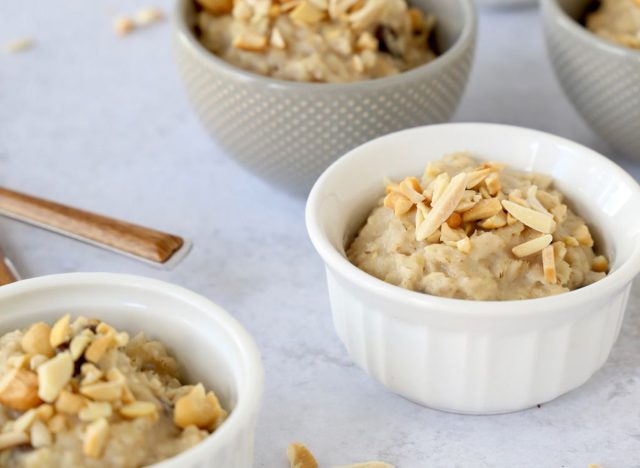
Oatmeal contains soluble fiber, which has been shown to help lower blood cholesterol levels.
Get the recipe for Nutty Raisin Oatmeal.
Mid-Morning Snack: Greek yogurt, strawberries, almonds
Switch up this go to snack by changing the fruit and the nuts. You can even add granola instead of the nuts.
- ½ cup nonfat plain Greek yogurt
- ½ cup sliced strawberries
- 1 tbsp chopped raw almonds
Lunch: Grilled Chicken and Avocado Salad
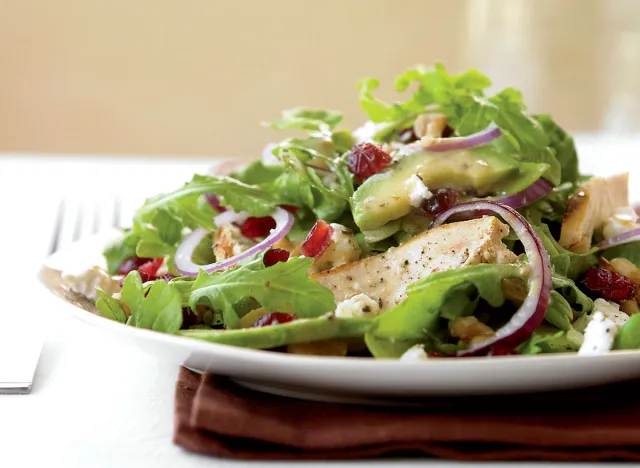
This lighter salad has avocado, which provides heart-healthy monounsaturated fat.
- Grilled chicken avocado salad
- 1 orange
Get the recipe for Grilled Chicken and Avocado Salad.
Afternoon Snack: Artichoke Dip & Pita
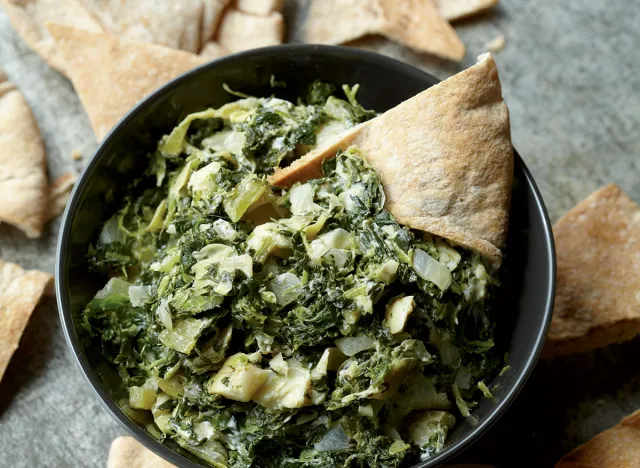
Dips are easy to grab and go to work. Swap out the pita for carrot sticks if you wish.
Get the recipe for Artichoke Dip and serve with whole wheat pita.
Dinner: Sheet Pan Chili-Lime Salmon
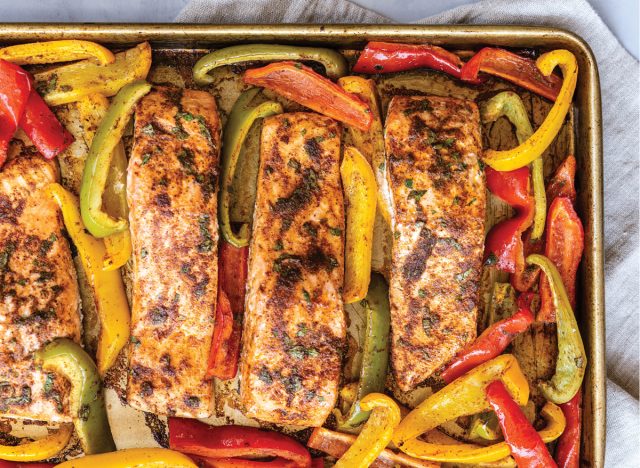
Salmon provides omega-3 fats, shown to help prevent heart disease.
- Chili-Lime Salmon
- Mixed green salad topped with 1 tbsp balsamic vinaigrette
- ¾ cup cooked brown rice
- 1 cup diced pineapple
Get the recipe for Sheet Pan Chili-Lime Salmon.
Day 5
- Breakfast: Breakfast Loaded Sweet Potato
- Mid-Morning Snack: String cheese & pear
- Lunch: Rotisserie Chicken, Kale, and White Bean Salad
- Snack: Hummus & veggies
- Dinner: Spicy Tuna and Avocado Fish Tacos
Breakfast: Breakfast Loaded Sweet Potato
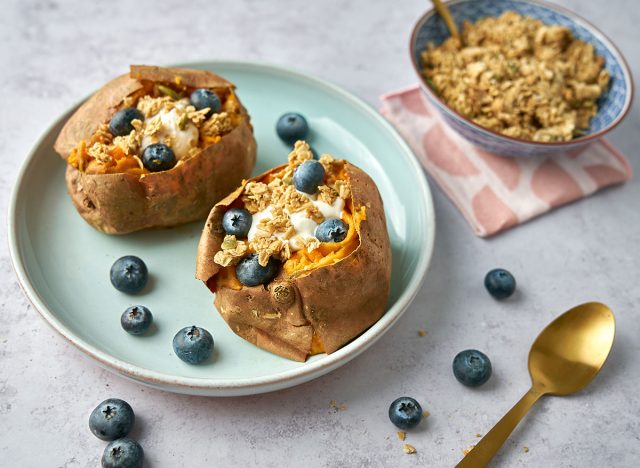
Sweeten your breakfast repertoire with this loaded sweet potato topped with Greek yogurt and fruit.
Get the recipe for Breakfast Loaded Sweet Potato.
Mid-Morning Snack: String cheese & pear
Easy does it. This simple snack pairs a calcium-filled cheese stick with a piece of fruit.
- 1 string cheese
- 1 pear
Lunch: Rotisserie Chicken, Kale, and White Bean Salad
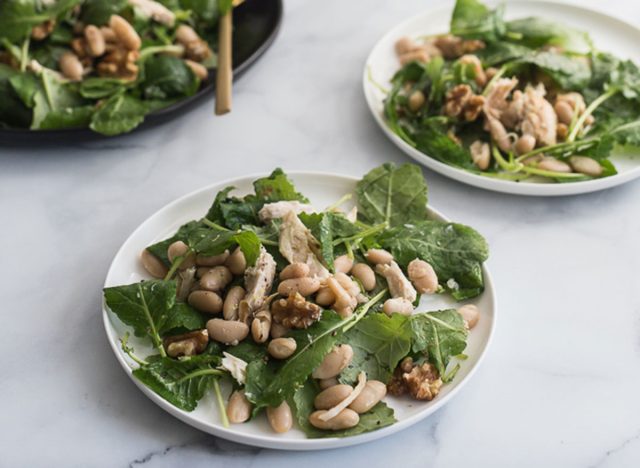
Rotisserie chicken can be part of a heart-healthy diet—just remove the skin.
- 1 small whole wheat roll with 1 tsp butter
- 1 cup sliced strawberries
- Rotisserie Chicken, Kale, and White Bean Salad
Get the recipe for Rotisserie Chicken, Kale, and White Bean Salad.
Afternoon Snack: Hummus & veggies
Back to basics with this hummus and veggie snack.
- 1/4 cup hummus
- 1 cup cut-up vegetables like celery, bell peppers, zucchini, and carrots
Dinner: Spicy Tuna and Avocado Fish Tacos
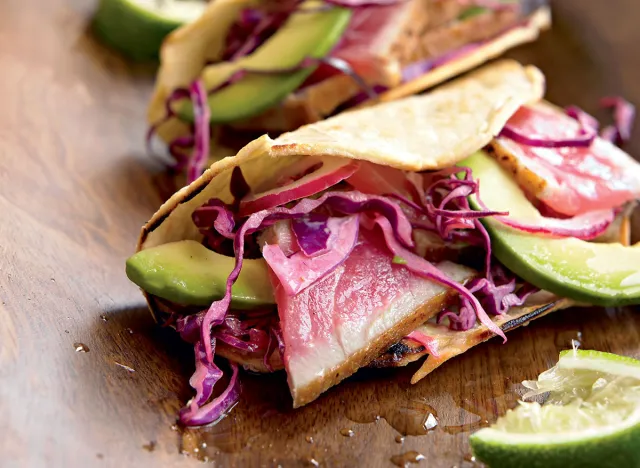
Fish tacos are a must-have during the week. Made with omega-3-packed tuna, they're as heart-healthy as you can get.
Get the recipe for Spicy Tuna and Avocado Fish Tacos.

